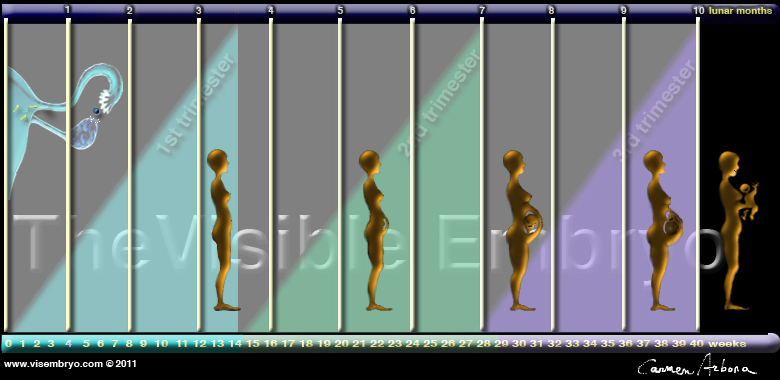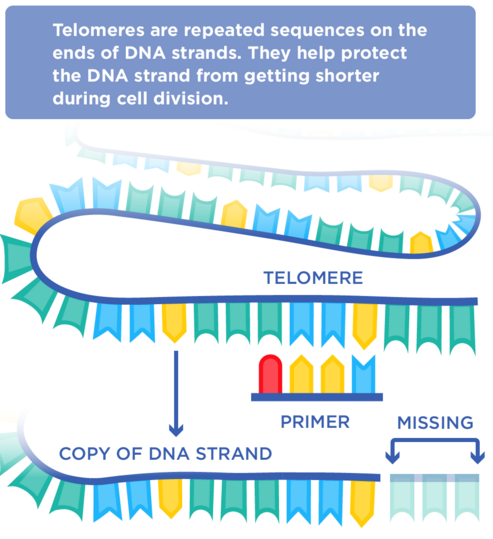|

CLICK ON weeks 0 - 40 and follow along every 2 weeks of fetal development
|
||||||||||||||||||||||||||||
|
Developmental Biology - Telomeres Relax Through Your Pregnancy Telomere length is a molecular marker of cell aging. Linked to life expectancy and a range of age-related disorders, the effects of maternal stress have been widely studied, data on protective maternal factors and their positive effects on child development remain limited. Researchers, led by Sonja Entringer PhD, proffessor of Charité's Institute of Medical Psychology, have shown that a mother's ability to cope with stress during pregnancy - her 'psychological resilience' - is linked to telomere length. The more positive a mother's attitude during pregnancy, the longer her children's telomeres. Entringer was awarded a European Research Council 'Starting Grant' in 2016, which enabled her to develop her research. "Positive maternal psychological characteristics are biologically embedded and have a protective effect on the fetus," explains Proffessor Entringer. In a previous study, researchers had examined the way maternal stress in pregnancy affected telomere length in their offspring. The current study, which saw Prof. Entringer's team work with Nobel Laureate Elizabeth Blackburn of the University of California along with colleagues in Finland, also gave them access to a large study population made up of 650 mother and child pairs. Telomere length was determined at birth, using cells from cord blood. Positive attitude in the face of stress was determined using a 'resilience index', took into account the pregnant women's psychological wellbeing and perceived social support. "This study underlines the importance of maternal psychological well being during pregnancy in the developmental programming of lifelong health and disease; and, the significance of improved psychosocial support during pregnancy." Abstract Objective: In the context of the importance of elucidating the determinants of the initial, newborn setting of telomere length (TL), it is increasingly evident that maternal stress and stress-related processes during pregnancy play a major role. Although psychological resilience may function as a buffer, research in this area has not yet examined its potential role vis-à-vis that of stress. The authors examined the relationship between maternal psychological resilience during pregnancy and newborn TL. Methods: In a sample of 656 mother-child dyads from the Prediction and Prevention of Preeclampsia and Intrauterine Growth Restriction cohort, multiple serial assessments were conducted over the course of pregnancy to quantify maternal stress, negative and positive emotional responses to pregnancy events, positive affect, and perceived social support. Principal component analysis identified two latent factors: stress and positivity. A measure of resilience was computed by regressing the positivity factor on the stress factor, in order to quantify positivity after accounting for stress. TL was measured using quantitative polymerase chain reaction in leukocytes extracted from cord blood shortly after birth. Linear regression was used to predict newborn TL from maternal resilience during pregnancy, adjusting for other potential determinants. Results: Maternal stress significantly predicted shorter newborn TL (ß=-0.079), and positivity significantly predicted longer TL (ß=0.135). Maternal resilience (positivity accounting for stress) was significantly and positively associated with newborn TL (ß=0.114, 95% CI=0.035, 0.189), with each standard deviation increase in resilience predicting 12% longer newborn TL. Conclusions: The results indicate that maternal psychological resilience may exert a salubrious effect on offspring telomere biology and highlight the importance of enhancing maternal mental health and well-being during pregnancy. Authors Glenn Verner MPH, Elissa Epel PhD, Marius Lahti-Pulkkinen PhD, Eero Kajantie MD, PhD, Claudia Buss PhD, Jue Lin PhD, Elizabeth Blackburn PhD, Katri Räikkönen PhD, Pathik D. Wadhwa MD, PhD and Sonja Entringer PhD. Return to top of page. | Sep 14 2020 Fetal Timeline Maternal Timeline News  |
||||||||||||||||||||||||||||

